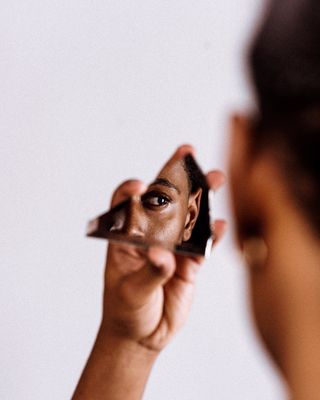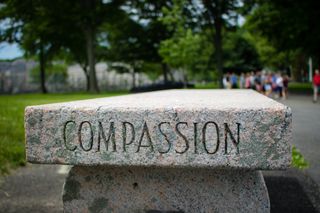Moving from judgment to compassion.
Posted May 4, 2020 | Reviewed by Lybi Ma

Source: Jurien Huggins/Unsplash
I feel like I have “Abuse Me” written across my forehead! Why does this keep happening to me?
Over the years I’ve lost track of how many people have asked me that question.
The first time an individual is victimized, they often take on the responsibility for the abuse. This can be a way for a victim to reclaim control. It is reassuring to believe that changing habits, behaviors, or interactions will ensure that the abuse will not reoccur.
When someone is victimized a second or third time (or more), research shows they are even more likely to feel guilt and shame and to judge themselves harshly. Unfortunately, they are not alone. Family, friends, professionals, and the media often respond to revictimized people with far more judgment than compassion.
Saints, sinners, heroes, villains, the beautiful, the scarred, disciplined, undisciplined, strong, weak, and people of every other type have been victimized. Abuse, whether it is a single or a repeated event, is not elicited by victims; it is perpetrated against them by an offender.
A traumatizing abuse experience will often leave a victim in severe emotional and psychological distress, and sometimes in physical pain. The resulting symptoms, including those of post-traumatic stress disorder (PTSD), are attempts by the body, mind, and emotions to regain stability and to reduce this extreme distress. Ironically, defensive responses can place the victim at greater “risk for later interpersonal trauma.” (Jaffe et al. 2019) These trauma symptoms include: dissociation, alcohol and substance abuse, distorted perceptions, low self-esteem, risky behaviors, cognitive accommodation to on-going violence, learned helplessness or passivity in the face of danger, willingness to tolerate maltreatment in order to avoid abandonment, adaptation to socioeconomic stressors and discrimination, (Briere, 2019) increased irritability and anger. (Jaffe, et al. 2019)
Facts, provided by research, can serve as instruments of kindness.
Jaffe, et al. (2019) stated it succinctly: “The most consistent predictor of future trauma exposure is a history of prior trauma exposure.” A child who is abused is at a significantly higher risk of being revictimized in adolescence and/or adulthood. (Aakvaag, et al., 2019; Zamir, et al., 2018)
These facts, established by scientific research and supported nearly unanimously by experts across the fields of mental health and the social sciences, provide a strong rebuttal to knee-jerk reactions that place blame for revictimization on the innate characteristics of individual victims.
The field of psychology has gone through its own evolution in understanding revictimization. In 1920 Freud published Beyond the Pleasure Principle, in which he identified repetition compulsion as a repeating and reliving of painful experiences in lieu of holding them in memory. (Zamir, et al. 2018) This theory, part of Freud’s developing understanding of human instinct, when applied more recently to revictimization, places the bulk of responsibility squarely on the psyche of the victim.
As the understanding of trauma and PTSD developed in the field, via both research and practice, new theories of revictimization developed based on the impact of an original trauma on a repeatedly abused person.
The facts establish that when a person is sexually assaulted multiple times or in several domestic violence relationships, the cause of that pattern is not some underlying masochism, a characterological failing, or any other personal flaw. All abuse, original and subsequent, is due to the actions of offenders. A victim’s vulnerability to revictimization is often directly related to the impact of inflicted trauma.
A central component to the theoretical models of revictimization, developed in the 1980s and 1990s, was the role of dissociation as a risk factor. (Zamir, et al., 2018)
Dissociation is a defense mechanism that protects the individual by breaking up consciousness to avoid being overwhelmed by an experience, memory, or sensation. This fragmenting can be as commonplace as distraction or daydreaming, or it can manifest more problematically as emotional detachment, numbing, or out-of-body experiences.
Disassociation may provide relief from distress, but when it develops into a behavioral pattern, outlasting the threat of the immediate abuse, it leaves the person increasingly vulnerable. They miss cues of danger and have a disrupted, discontinuous experience of themselves and their life.
Guilt and shame are two distinct, common remnants of having been victimized. While guilt involves the belief that one “should have thought, felt, or acted differently,” shame is a “painful emotion related to beliefs about threats to one’s social position, including devaluation and rejection.” (Aakvaag et al., 2018)
Guilt can increase the risk of revictimization by focusing our attention, in an exaggerated manner, on our own thoughts and feelings, leaving us vulnerable to missing external cues of danger.
Shame often leads to social withdrawal and isolation. (Aakvaag et al., 2018) Decreasing our connections to others increases our vulnerability because while we may be avoiding people likely to cause us harm, we are also losing access to those who would provide protection, support, an increased sense of personal worth, and the expectation of being well-treated.
Shame is strongly correlated with mental health problems in general and with many PTSD symptoms specifically. The Aakvaag et al. findings suggest that shame may be central to the causal link that earlier studies found between mental illness and revictimization.
Kindness and compassion demand that we consistently hold a conscious place for the role of the abuser in any dialogue with or about victims. Experience has taught me that when an abuser is forgotten, the victim is implicitly left to absorb responsibility for the abusive acts and the resulting conditions, thereby increasing the victim’s feelings of both guilt and shame. This pattern is all the more common when the offender is a loved one, providing further motivation for a victim (child or adult), to absorb responsibility for the actions and patterns of the other in an attempt to rescue a crucial, valued relationship.

Source: Dave Lowe/Unsplash
A person who has been victimized needs to heal from the injuries of abuse. Family, friends, support networks, medical, and mental health professionals should be united in promoting that healing for the purpose of restoring health and wellness. A secondary benefit of compassion is the reduction of trauma symptoms, hence a decrease in vulnerability to revictimization.
References
Jaffe, A. E., DiLillo, D., Gratz, K.L., Messman-Moore, T.L. (2019). Risk for revictimization following interpersonal and noninterpersonal trauma: Clarifying the role of posttraumatic stress symptoms and trauma-related cognitions. Journal of Traumatic Stress, 32, 42-55.
Briere, J. (2019). Treating Risky and Compulsive Behavior in Trauma Survivors. New York: The Guilford Press.
Aakvaag, H. F., Thoreson, S., Strom, I. F., Myhre, M., Hjemdal, O. K. (2019). Shame predicts revictimization in victims of childhood violence: A prospective study of a general Norwegian population sample. Psychological Trauma: Theory, Research, Practice and Policy, Vol 11, No. 1, 43-50.
Zamir, O., Szepsenwol, O., Englund, M. M., Simpson, J. A. (2018). The role of dissociation in revictimization across the lifespan: A 32-year prospective study. Child Abuse & Neglect, 79, 144-153.
Gay, P. (1988). Freud: A Life for Our Time. New York, NY: W. W. Norton & Company.Morereferences
Een reactie plaatsen
